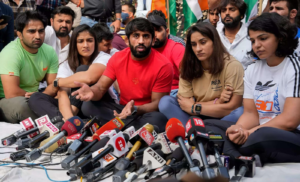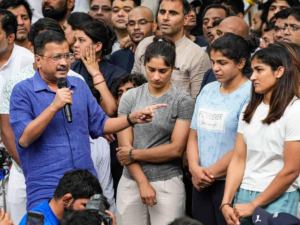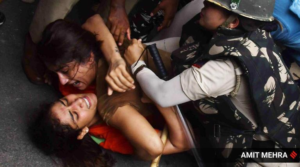
Unveiling the Shadows: The Struggle for Justice and Dignity in the 2023 Indian Wrestlers' Protest

Introduction:
In January 2023, a group of Indian wrestlers sparked a nationwide protest demanding an investigation into the allegations of sexual harassment against BJP MP Brij Bhushan Sharan Singh.
The wrestlers accused Singh, who served as the president of the Wrestling Federation of India (WFI), of groping, stalking, intimidation, and demanding sexual favors in exchange for professional help.
These allegations led to a shared sense of fear and trauma among the women wrestlers, prompting them to speak out against their alleged abuser. This article delves into the details of the 2023 Indian Wrestlers’ Protest, highlighting the challenges faced by the wrestlers in their pursuit of justice and dignity.

The Protests and Allegations:
The sit-in protests, organized at Jantar Mantar in New Delhi, shed light on the sexual harassment allegations against Brij Bhushan Sharan Singh. Female wrestlers came forward, accusing Singh of engaging in inappropriate behaviour without their consent, including touching their breasts and navels, as well as demanding sexual favours in exchange for professional support. These revelations instilled a sense of fear and trauma among the women wrestlers, leading them to demand an investigation into the matter.
Initial Response and Government’s Promise:
In response to the protests, the Central Government assured the wrestlers that a committee would be formed to investigate the allegations. Encouraged by this promise, the wrestlers called off their protests in January 2023.
However, as time passed without any visible progress or the public disclosure of the committee’s report, the protesters resumed their agitation in April 2023. They expressed dissatisfaction with the authorities’ inaction and accused the committee of bias in favour of the accused.
Accusations of Inaction and Government Interference:
The Delhi Police, which falls under the jurisdiction of the ruling Bharatiya Janata Party (BJP), faced severe criticism for its alleged inaction and refusal to register a First Information Report (FIR) in the case. The FIRs were only registered after the intervention of the Supreme Court, despite the Indian law mandating immediate registration of FIRs for cognizable offenses like sexual harassment. This raised questions about the impartiality and fair application of the law.
The Role of Political Parties and Support from Athletes:
Numerous opposition leaders, including Arvind Kejriwal, Priyanka Gandhi, and Rahul Gandhi, expressed their support for the wrestlers’ protests. Several BJP leaders, such as Satya Pal Malik and Anil Vij, also voiced their backing for the movement.
The protests received widespread support from prominent athletes, including Abhinav Bindra, Neeraj Chopra, and Sania Mirza, who took to social media to show solidarity with the wrestlers. This collective support showcased the gravity of the issue and highlighted the need for justice and dignity in sports.

International Condemnation and Sporting Bodies’ Intervention:
International sporting bodies, including United World Wrestling and the International Olympic Committee, condemned the treatment of the wrestlers by the Indian authorities.
They criticized the manhandling, arrest, and temporary detention of the athletes and called for a thorough investigation into the allegations against Brij Bhushan Sharan Singh.
United World Wrestling set a 45-day deadline for the elections of a new WFI administration, warning that a failure to meet this deadline could result in the suspension of WFI and force Indian athletes to compete under a neutral flag.
Clashes and Police Brutality:
During the protests, clashes erupted between the Delhi Police and the protesters at Jantar Mantar. The police reportedly used force to disperse the demonstrators, resulting in injuries to both the protesters and security personnel.
Wrestlers alleged that they were manhandled and detained, with some of them claiming to have faced police brutality. Videos and images of the clashes circulated on social media, drawing further attention to the issue and amplifying the protesters’ demands for justice.

Media Coverage and Social Media Outrage:
The protests gained significant media coverage both in India and internationally. News outlets reported on the allegations, the protests, and the subsequent police actions. Social media platforms played a crucial role in spreading awareness about the issue, with hashtags such as #WrestlersProtest and #JusticeForIndianWrestlers trending on various platforms. Many users expressed their outrage at the alleged misconduct and demanded accountability from those in positions of power.
Legal Proceedings and Investigation:
Following the resumption of protests, the Supreme Court of India took cognizance of the matter and ordered an investigation into the allegations against Brij Bhushan Sharan Singh. The Court appointed a three-member panel to look into the complaints and submit a report within a specified timeframe. The panel was tasked with ensuring a fair investigation and addressing the concerns of the wrestlers.
Long-term Implications and Cultural Shift:
The Indian Wrestlers’ Protest has sparked a larger conversation about sexual harassment and abuse within the sports community in India. It has shed light on the power dynamics and vulnerability faced by athletes, particularly women, when seeking professional opportunities and support. The protests have highlighted the urgent need for comprehensive policies, awareness programs, and support systems to protect athletes from exploitation and harassment.
Additionally, the protest has put the spotlight on the role of sports federations and governing bodies in safeguarding the rights and dignity of athletes. It has called for transparency, accountability, and fair representation within these organizations to ensure a conducive and safe environment for athletes to thrive.

Conclusion:
The 2023 Indian Wrestlers’ Protest stands as a powerful testament to the courage and determination of the athletes who spoke out against alleged sexual harassment. It has become a catalyst for change, demanding justice, dignity, and systemic reforms within the sports community in India.
The protests, supported by opposition leaders, athletes, and international sporting bodies, have brought significant attention to the issue and raised hopes for a fair and impartial investigation.
The ultimate goal is not only to hold the accused accountable but also to create an environment where athletes can pursue their passion without fear of exploitation or abuse.
The journey towards justice and cultural transformation continues as the wrestlers and their supporters persist in their fight for a safer and more equitable sporting landscape.







